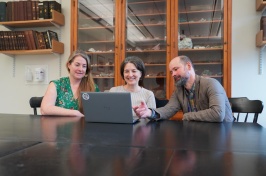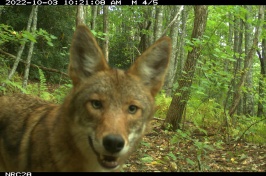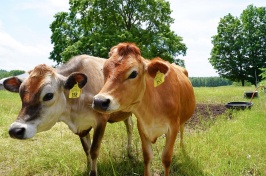NHAg COLSA
Estrogen in Clover?
Researchers at UNH find drought increases phytoestrogen levels in red clover, impacting dairy cows’ health. Kura clover shows promise as a resilient forage alternative. Read More-
06/19/24
Microplastics in Estuaries
Estuaries in New England are crucial for wildlife and aquaculture, but microplastics pose a growing threat. UNH researchers are studying microplastic... -
06/17/24
Aquatic Plants Could Help Reduce Water Pollution
Tiny aquatic plants called duckweed and their microbes could be engineered to cleanse chemicals from runoff water. Anna O'Brien's research at UNH... -
06/07/24
Best Radicchio Varieties for New England Farmers
Granite State farmers can boost sustainability by adding high-demand radicchio to their crops, and research at UNH is aiding that effort by... -
04/04/24
Maine Farmers Receptive to Seaweed Feed
New research involving UNH scientists reveals Maine organic dairy farmers prioritize cost and supply issues but are open to paying more for...
Recent Stories
-
04/11/23 - Researchers Examine Using Flowering Plants to Attract Hover Flies for Pest ControlUNH alumni and faculty from the NH Agricultural Experiment Station conducted research on insectary plants as habitats for hoverflies, a natural pest control solution. Read More
-
04/10/23 - New Research into Potential Impacts of Beech Leaf Disease (BLD) to Begin at UNHJeff Garnas from UNH is launching a study on beech leaf and bark disease's impact on trees in eastern forests to better understand mortality patterns. Read More
-
02/24/23 - Monitoring Forest Edge Changes Using DronesScientists with the New Hampshire Agricultural Experiment Station (NHAES) and the UNH College of Life Sciences and Agriculture are using unpiloted aerial systems to examine how... Read More
-
02/02/23 - New Study Examines Disproportionately High Food Insufficiency Rates Among LGBTQ+ New EnglandersNew study by NHAES researcher shows that while cisgender New Englanders face lower food insufficiency than others in the U.S., LGBTQ+ residents in the region face 2-3 times higher... Read More
-
12/19/22 - UNH Researcher Examines Abundance Factors of Striped Skunk Across Contiguous United StatesNew research from the New Hampshire Agricultural Experiment Station examines factors that affect skunk abundance in the region and across the United States, underscoring the... Read More
-
11/29/22 - Preventing Coccidiosis Using Sodium ButyrateStation scientist Pete Erickson, professor of dairy management in the UNH College of Life Sciences and Agriculture, has found evidence that the compound sodium butyrate—a nutrient... Read More
-
11/18/22 - Alternative Forages for Seasonal SlumpsIn farming, a ‘summer slump’ refers to the periods of the growing season when traditional forage plants—eaten by livestock—don’t grow well or aren’t readily available. Scientists... Read More
-
10/26/22 - Research That Makes a Difference for New HampshireBecky Sideman is performing sustainable agriculture research with great benefit to New Hampshire and New England. Read More
-
09/22/22 - Grass-Fed Organic Dairy Management May Be Key to Sector’s Resilience in New EnglandHow is organic grass-fed management different? There is some overlap in the practices used in organic grass-fed (OGF) management and more traditional organic dairy... Read More
-
09/06/22 - The Changing Lamprey RiverThe Lamprey River Hydrological Observatory has been collecting data on the chemistry and hydrology of the 212-square-mile Lamprey River watershed, providing a baseline of data on... Read More




































































